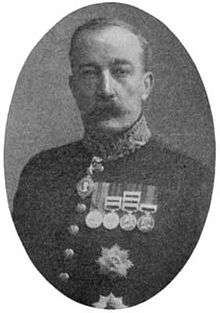George Roos-Keppel
| George Olaf Roos-Keppel | |
|---|---|
 | |
| Born | 7 September 1866 |
| Died | 11 December 1921 |
| Allegiance |
|
| Service/branch | British Army |
| Years of service | 1886–1920 |
| Rank | Lieutenant Colonel |
| Battles/wars | Third Anglo-Afghan War |
| Awards |
Knight Grand Commander of the Order of the Indian Empire (1917) Knight Commander of the Order of the Star of India(1915) |
Lieutenant Colonel Sir George Olaf Roos-Keppel GCIE KCSI (7 September 1866 – 11 December 1921) was a British military officer who served in the capacities of Political Agent to the Governor-General in Kurram and Khyber, and later as Chief Commissioner, North West Frontier Province from 1908 till 1919. He is also known for his role in 3rd Afghan War.[1]
He was commissioned in the Royal Scots Fusiliers in the 1880s and was promoted to Lieutenant in 1892 and to Captain in 1895. In 1900 he was appointed a CIE and was promoted to Brevet Major in 1902, receiving further promotions to Major in 1904 and to Brevet Lieutenant-Colonel in 1907. In 1908, he was knighted with the KCIE and was promoted to full Lieutenant-Colonel in 1912.
In 1913, Roos-Keppel, along with Nawab Sir Sahibzada Abdul Qayyum established Islamia College (Peshawar), which was inaugurated by Haji Sahib Turangzai. Roos-Keppel was also president of Central Committee of Examiners in Pashto. He is credited with foreseeing the genius in the young Cambridge graduate Inayatullah Khan by appointing him, at the age of 24, the Vice Principal of Islamia College (Peshawar) in 1913, and then the Principal in 1917. He was appointed a KCSI in 1915 and a GCIE in 1917. He formally retired from the Indian Army in 1920 and died on 11 December of the following year, aged 55.
Academic contributions
Roos-Keppel was well versed in the Pashto language:
- In 1901, he produced his own editions from T. B. Hughes' English translations of Ganj-e-Pashto and Tarikh-e-Sultan Mahmud-e-Ghaznavi. These editions replaced the older versions as textbooks for Military officers.
- He also authored 'The Pashto Manual' as a guide book on colloquial Pashto in 1901, followed by a second impression in 1907 while serving as Captain in the Khyber
Notes
- ↑ Sir Olaf Caroe, The Pathans, London: Macmillan, 1958
| Government offices | ||
|---|---|---|
| Preceded by Harold Deane |
Chief Commissioner of the North-West Frontier Province 1908–1909 |
Succeeded by William Rudolph Henry Merck |
| Preceded by William Rudolph Henry Merck |
2nd term 1910–1913 |
Succeeded by Sir John Stuart Donald |
| Preceded by Sir John Stuart Donald |
3rd term 1915–1919 |
Succeeded by Sir Alfred Hamilton Grant |